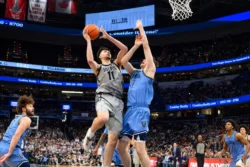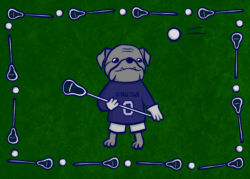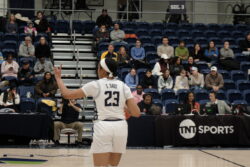“This wind is extreeeeeeme!” a men’s club Ultimate Frisbee player shouted as he jogged onto Kehoe a few minutes late for practice. It was a remarkably windy day, but his teammates had decided to continue their workout in preparation for upcoming tournament play.
After a few warm-up laps and stretching, the group began tossing around the Frisbees in pairs, competing to see who could reach 10 tosses first (all the losers have to do pushups). Following a minor controversy over what happened to the bag of discs entrusted to an ex-player/quasi-coach who decided not to brave the gales, the team quickly adjusted—they seem familiar with B.Y.O.F, and grabbed Frisbees from the sidelines. Despite the resistance from Mother Nature, it is clear from their deft flicks that most players are a few notches above casual players on Copley lawn.
Few sports are as ambitiously titled as Ultimate Frisbee. Imagining that naming process conjures up images of long-haired hippies tossing around discs and rejecting adjectives like “rad” or maybe “far-out” until they hit on something you know, like, totally extreme. That’s not all that far from the actual origin myth of the sport, invented by a kid from Jersey in the late `60s and based on a camp game his counselor described as the “ultimate sports experience.” But both the Georgetown men’s and women’s club Ultimate teams say this hackysacking, lackadaisical image has nothing to do with the intense, athletic version of the game they play.

“It’s not a game anymore,” Christina “Napoleon” Mamangakis (COL ’07) said. “It’s been elevated to the level of a sport.”
Women’s co-captain Lindsay Trice (COL ’09) says the game has elements of football (scoring in an endzone), basketball (boxing out and using a pivot foot), and soccer (field sense and constant movement). Of course, there are particular, very controlled skills involved with tossing and catching a disc, like your basic huck (long throw), layout (horizontal to the ground catch) and hammer (an over-the-head toss). Matches usually last around an hour and a half, and thus reward endurance as well. Though there are a few players on each squad who competed in high school, most are former high school athletes from diverse athletic backgrounds who wanted to continue competing without the pressures of a Division I varsity sport.
“It’s mostly athleticism,” Captain Ryan Moore (MSB’07) said. “If you can run fast and catch, the throws will come with experience. A young guy that can run and catch is just as valuable to the team as someone like me who’s been playing for a while.”
The women’s team has 13 players on the squad, a small roster considering that seven are required on the field at all times. Despite the fact that they are often forced to “play savage” (without substitutes), they are in contention to make the regional championships, a feat they have accomplished four out of the five years the club has been in existence. The men, though they count 19 members on their team, do not have quite the same record of success. Moore attributes this fact to the larger pool of competitors in the men’s division—20 colleges compete for three regional spots, versus 11 for five spots among the girls. Both teams play a similar schedule, consisting mainly of area rivals like American University, George Washington and Delaware. Both teams practice 2-3 times a week, plus weekend tournaments or runs to the National Mall, but like all club teams at Georgetown, have difficulty fighting for field space and cannot play any of their games at home.
One of the most frequently mentioned aspects of the sport is “spirit of the game,” a code of sportsmanlike conduct written into the constitution of the Ultimate Players Association that prescribes that players self-referee. In big tournaments there are “observers” who act as a sort of appeals system, but this lack of officials is a big reason why Ultimate is not sanctioned by the NCAA or Olympic committee, and in allegiance to the core values of the “spirit of the game” many players don’t want this to happen. This doesn’t mean it’s a gentlemanly vision of etiquette; in fact, “heckling is a must,” according to Mamangakis.
Both teams credit the social aspects of the team for their love of the sport. Victories (and perhaps even defeats) are celebrated in championship style, says Phil Mantyh (SFS ’09), who claims that the liquid held by a deceptively shallow Frisbee is “definitely equal to at least three beers.” The girls, for their part, finish one another’s sentences and enthuse that the sport is “ridiculously fun” and tends to attract (and retain) players who are intense but “quirky, alternative, ridiculous.” (They use the word ridiculous a lot. Apparently it’s a really good thing.) Team bonding includes anything from pasta dinners and tie-dye parties to dance lessons from Groove Theory, from which the squad learned the entire routine to “Walk it Out,” which they now incorporate as part of a salute to the opposition at the close of each match. Co-captain Rebecca Shinners (COL ’09) , Trice and 13 Georgetown Ultimate players took two buses and a train last spring break to Georgia to play what were essentially pickup (“hat”) matches. The Hoyas were welcomed with a place to stay by a group of college girls they didn’t know, simply because they play the sport. While the men and women’s teams don’t practice together, somewhere along the line they’re finding time for some intra-squad personalized huck and layout sessions, if you will—Shinners, Trice, and Mamangakis are all dating Ultimate players. Though it’s a club sport, it seems to have bled into every aspect of life for at least some of its players
“I dream about Ultimate after every tournament we play,” Shinners said.
Her teammates, not surprised, nodded in agreement.





